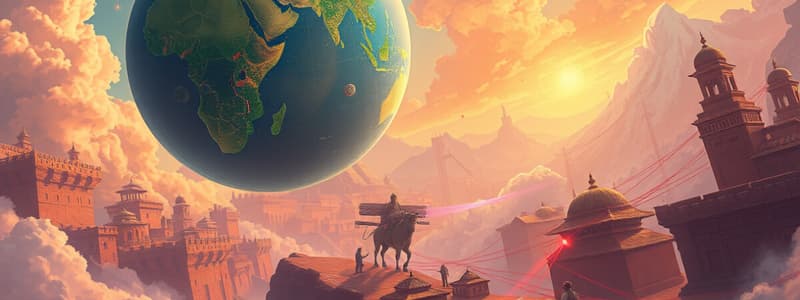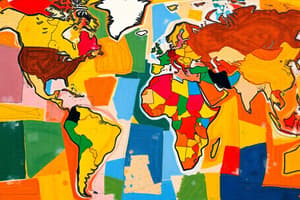Podcast
Questions and Answers
What characteristic of Eurasia facilitated the rapid spread of crops and animals during the prehistoric period?
What characteristic of Eurasia facilitated the rapid spread of crops and animals during the prehistoric period?
How did the invention of the wheel contribute to globalization?
How did the invention of the wheel contribute to globalization?
What role did writing play in the development of complex societies?
What role did writing play in the development of complex societies?
Which civilization is noted for becoming a large empire without the wheel or written language?
Which civilization is noted for becoming a large empire without the wheel or written language?
Signup and view all the answers
What was a major consequence of the establishment of empires during the premodern period?
What was a major consequence of the establishment of empires during the premodern period?
Signup and view all the answers
Which of the following empires is considered the most technologically advanced during the premodern period?
Which of the following empires is considered the most technologically advanced during the premodern period?
Signup and view all the answers
What marked the beginning of the unification of northeastern China under the Qin Emperor?
What marked the beginning of the unification of northeastern China under the Qin Emperor?
Signup and view all the answers
Which consequence did not result from the expansion of empires in the premodern world?
Which consequence did not result from the expansion of empires in the premodern world?
Signup and view all the answers
What was the approximate world population in the year 1750?
What was the approximate world population in the year 1750?
Signup and view all the answers
Which countries are identified as popular immigration destinations?
Which countries are identified as popular immigration destinations?
Signup and view all the answers
What is one of the main objections raised by Global Studies scholars regarding globalization?
What is one of the main objections raised by Global Studies scholars regarding globalization?
Signup and view all the answers
Which technological invention is NOT mentioned as a predecessor to contemporary innovations?
Which technological invention is NOT mentioned as a predecessor to contemporary innovations?
Signup and view all the answers
What significant event marked the end of the long process of settling all five continents approximately 12,000 years ago?
What significant event marked the end of the long process of settling all five continents approximately 12,000 years ago?
Signup and view all the answers
What political movements arose in the global North during the early 20th century?
What political movements arose in the global North during the early 20th century?
Signup and view all the answers
What was one of the primary benefits of the establishment of national joint stock companies during the early 1600s?
What was one of the primary benefits of the establishment of national joint stock companies during the early 1600s?
Signup and view all the answers
What ideologies gained traction during the intense nationalism of the 1930s?
What ideologies gained traction during the intense nationalism of the 1930s?
Signup and view all the answers
What aspect of globalization is emphasized in the short definition mentioned in Chapter 1?
What aspect of globalization is emphasized in the short definition mentioned in Chapter 1?
Signup and view all the answers
What does the term 'dark ages' refer to in the context of the historical timeline mentioned?
What does the term 'dark ages' refer to in the context of the historical timeline mentioned?
Signup and view all the answers
What historical achievements might one look back to in order to recognize the roots of interdependence?
What historical achievements might one look back to in order to recognize the roots of interdependence?
Signup and view all the answers
What significant global development resulted from the Atlantic slave trade?
What significant global development resulted from the Atlantic slave trade?
Signup and view all the answers
What major historical event concluded the period of extreme nationalism prior to the mid-20th century?
What major historical event concluded the period of extreme nationalism prior to the mid-20th century?
Signup and view all the answers
Which regions are mentioned as ideal for early agricultural settlements due to their geographic attributes?
Which regions are mentioned as ideal for early agricultural settlements due to their geographic attributes?
Signup and view all the answers
How did warfare contribute to globalization during the early modern period?
How did warfare contribute to globalization during the early modern period?
Signup and view all the answers
According to critics, how should the relationship between globalization and modernity be considered?
According to critics, how should the relationship between globalization and modernity be considered?
Signup and view all the answers
What was one outcome of the food surpluses achieved by early farmers and herders?
What was one outcome of the food surpluses achieved by early farmers and herders?
Signup and view all the answers
What was the outcome of the atomic bombings during the Second World War?
What was the outcome of the atomic bombings during the Second World War?
Signup and view all the answers
What did the Westphalian peace treaty signify in the context of nation-states?
What did the Westphalian peace treaty signify in the context of nation-states?
Signup and view all the answers
What period followed the Second World War and saw significant political changes in the global South?
What period followed the Second World War and saw significant political changes in the global South?
Signup and view all the answers
How did the Western Roman Empire's fall impact the trajectory of globalization?
How did the Western Roman Empire's fall impact the trajectory of globalization?
Signup and view all the answers
Which of the following is emphasized about global innovations?
Which of the following is emphasized about global innovations?
Signup and view all the answers
What type of societal response did migration countries experience due to transcontinental migration?
What type of societal response did migration countries experience due to transcontinental migration?
Signup and view all the answers
What does the concept of the 'global imaginary' refer to?
What does the concept of the 'global imaginary' refer to?
Signup and view all the answers
How did Europeans perceive their role in relation to distant lands by the late 18th century?
How did Europeans perceive their role in relation to distant lands by the late 18th century?
Signup and view all the answers
What change occurred approximately 10,000 years ago that significantly altered human social interaction?
What change occurred approximately 10,000 years ago that significantly altered human social interaction?
Signup and view all the answers
What impact did the incorporation of Australia and Pacific islands have on European globalization in the late 18th century?
What impact did the incorporation of Australia and Pacific islands have on European globalization in the late 18th century?
Signup and view all the answers
What geographical feature is emphasized for its role in the expansion of early agricultural societies?
What geographical feature is emphasized for its role in the expansion of early agricultural societies?
Signup and view all the answers
What is a primary reason that many scholars debate about proper historical chronology in globalization?
What is a primary reason that many scholars debate about proper historical chronology in globalization?
Signup and view all the answers
Which event is noted as an example of unanticipated surprises in the history of globalization?
Which event is noted as an example of unanticipated surprises in the history of globalization?
Signup and view all the answers
What did the early modern period contribute to the formation of social hierarchies during the expansion of European nations?
What did the early modern period contribute to the formation of social hierarchies during the expansion of European nations?
Signup and view all the answers
What aspect of the colonial exploitation did not benefit the trading partners of European nations?
What aspect of the colonial exploitation did not benefit the trading partners of European nations?
Signup and view all the answers
Study Notes
Globalization and Historical Context
- Globalization's novelty challenged by scholars who argue it is not fundamentally different from historical modernization.
- A critical inquiry into globalization’s historical roots is essential for understanding its current dimensions.
- Globalization defined as a dynamic, multidimensional process with deep historical origins rather than a modern invention.
Technological Innovations and Historical Milestones
- Modern technologies (e.g., iPhone, self-driving cars) built upon earlier inventions like the steam engine, telephone, and printing press.
- Significant prehistoric achievements, including domestication of plants and animals, the wheel's invention, and the development of writing, influenced development patterns.
- Major advancements occurred mainly in the Fertile Crescent, North Africa, and Eurasian landmass, directly impacting global interconnectivity.
The Age of Empires and Global Networks
- The rise of empires (e.g., Roman, Byzantine, Islamic caliphates) fostered long-distance communication and cultural exchanges.
- The Chinese Empire emerged as a significant historical force in globalization, demonstrating early interactions among regions.
- European powers (Spain, Portugal, Netherlands, etc.) initiated exploration and establishment of overseas trade networks through joint-stock companies, setting a precedent for colonial expansion.
Warfare as a Catalyst
- Warfare contributed significantly to globalization, leading to the emergence of sovereign nation-states from the 17th century onward, following political shifts like the Westphalian peace treaty.
- Constant modifications in military alliances shaped the course of inter-state interactions and global communication.
Social and Economic Transformations in the Modern Period
- The modern period (1750–1980s) witnessed a dramatic population increase from 300 million (1 AD) to 4.5 billion (1980) due to increased agricultural capacity and urbanization.
- Major transcontinental migrations transformed cultural exchanges, while countries like the USA and Canada leveraged these populations for economic growth.
Nationalism and Global Tensions
- The early 20th century saw rising nationalism, leading to significant political movements and eventual global conflicts, including World War II.
- The war prompted a recognition of the futility of national separation and accelerated movements toward decolonization, particularly in the 1950s and 1960s.
Post-War Globalization and its Implications
- The devastation of World War II, exemplified by the use of atomic bombs, underscored the interlinked nature of nations.
- The period following the war facilitated the emergence of new nation-states and intensified global exchanges, marking a significant shift in international relations and globalization dynamics.
Studying That Suits You
Use AI to generate personalized quizzes and flashcards to suit your learning preferences.
Description
Explore the complexities of globalization by examining its historical roots and how it parallels modernization. This quiz delves into significant technological milestones and the role of empires in shaping global networks. Reflect on the dynamic and multidimensional nature of globalization through time.




